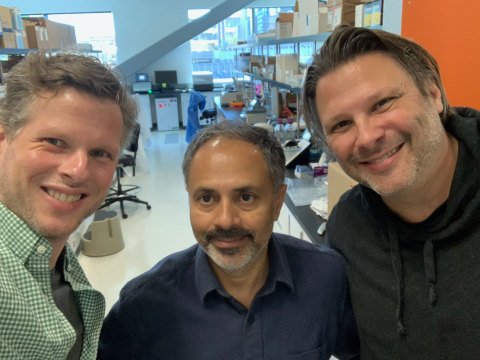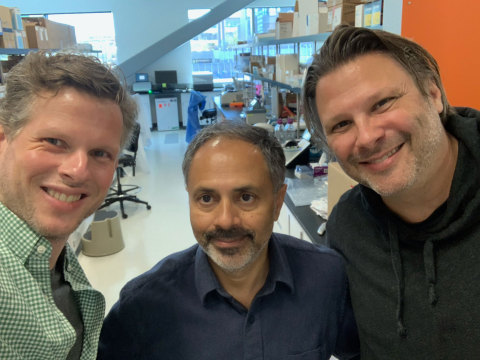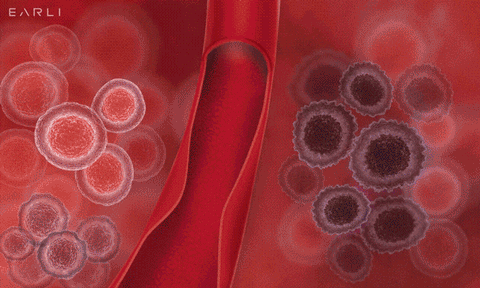SAN FRANCISCO--(BUSINESS WIRE)--The biotech industry has been aspiring to develop breakthrough technologies that hold promise for acting early on cancer when the chances of survival are much higher. Bioengineering firm, Earli, which developed in stealth a new platform technology that will allow clinicians to exactly locate early cancers so they can be treated, today announced that it has raised $40 million in Series A funding. The financing was led by Khosla Ventures, along with Perceptive Advisors, Casdin Capital, Andreessen Horowitz, Sands Capital, and top individuals including Midas List investors Jim Breyer/Breyer Capital and Rahul Mehta, Goldman Sachs’s former CFO and CIO R. Martin Chavez, and biomedical device entrepreneur Shlomo Ben-Haim.
Using technology licensed from Stanford University, Earli is creating a new platform technology called a “Synthetic Biopsy,” which uses genetic constructs to force cancer to produce biomarkers not normally expressed in the human body. The Synthetic Biopsy locates early cancer, which then enables actionable therapies. Earli previously raised $19.5 million in a Seed investment in 2018, led by Andreessen Horowitz’s a16z Bio Fund and Marc Benioff, and supported by Menlo Ventures and ZhenFund. Jorge Conde is the Earli Board member from a16z, and Marc Andreessen serves as a Board Observer.
"The Earli platform is radically different from other early cancer detection and treatment approaches. It makes early detection localizable and therefore actionable, which is the critical next step needed for success against cancer," said Vinod Khosla, founder of Khosla Ventures. “We believe Earli has the potential to forever change the cancer playbook.”
“2020 proved that biotech can lead to incredible innovation and discovery in a condensed time frame,” added Justin Kao, Partner at Khosla Ventures who will join Earli’s Board of Directors. “Earli is reaching its clinical trial stage within two and a half years of inception -- a remarkable timeframe considering the depth of the project, the challenges of Covid-19, and the potential impact the company could have in the fight against cancer.”
“This round of funding from some of the world’s leading biotech investors comes right in time for Earli’s human clinical trials to begin, and on the way towards commercialization to help patients,” said Cyriac Roeding, CEO and co-founder of Earli. “Our commitment is to every person and family that has been impacted by cancer. By localizing cancer early so the disease can be treated, we can and will change the statistics.”
World-Class Advisory Board
Earli also announced today that Dr. Jim Allison, 2018 Nobel Laureate and Professor and Chair of Immunology at MD Anderson Cancer Center and Dr. Padmanee Sharma, Professor and Scientific Director of the Immunotherapy Platform at MD Anderson Cancer Center, as well as Bob Langer, Institute Professor at MIT and Co-founder of Moderna, joined Earli’s Scientific Advisory Board. They join the SAB with some of the top names in the industry, including:
- Phil Greenberg (ex-Co-founder Juno, Head of Immunology, Fred Hutchinson Cancer Research Center), and
- Lee Hartwell (Former President Fred Hutchinson Cancer Research Center, Nobel Laureate)
- Alan Ashworth (President Helen Diller Family Comprehensive Cancer Center, UCSF)
The full Scientific and Clinical Advisory Boards are here.
How Earli Works
Earli was founded on technology licensed from Stanford University, developed in the laboratory of the late co-founder and early cancer detection pioneer Dr. Sam Gambhir, the former Chair of the Department of Radiology and Director of the Canary Center for early cancer detection at Stanford University, using the “Synthetic Biopsy” as a contrarian approach. Instead of relying on biomarkers that may or may not be naturally shed by cancers, an injection releases a synthetic compound that disperses through the body and enters healthy cells randomly, and also cancer cells, if there are any. If it enters a cancer cell, and only if, it forces the cancer to reveal itself by expressing a “Synthetic Biopsy” that is normally not existent in human bodies, making it easy to detect. It does so by usurping pathways that cause the malignancy in the first place. Dr. Gambhir served as an advisor and Board member to Earli until his passing in July 2020.
“Traditional liquid biopsies used in cancer detection search for naturally shed biomarkers using chemistry via sequencing and methylation patterns on cell free circulating tumor DNA, detection of protein biomarkers or the presence of circulating tumor cells. This is a solution that becomes exponentially more challenging as the tumors get smaller and smaller,” said Dr. David Suhy, co-founder and Chief Scientific Officer at Earli. “And if the tumors are detected, they might be too small to image and localize, or traditional imaging cannot determine whether the tumors are malignant or benign. That means the early cancer cannot be treated.”
The Earli platform is designed to solve that problem. Instead of chemistry for detection, Earli uses biology to produce a series of cancer-activated synthetic biomarkers designed to detect the exact location of the malignancy within a specific tissue, so it can be treated via precision surgery or targeted radiation, or new immuno-oncology techniques.
Data from Earli Clinical Trials
Recent pivotal data has demonstrated that Earli’s detection technology could be scaled from mice bearing artificially induced cancers into dogs with naturally occurring spontaneous cancers, a vast step forward considering that the latter body mass is up to three orders of magnitude larger. Conducted in collaboration with UC Davis investigator Dr. Michael Kent, Professor of Radiation Oncology, and Director of the Center for Companion Animal Health, these results hold great significance because the canine study design closely mimics Phase 1 human clinical trials, the next step for Earli in 2021.
With 70 percent of all cancers today found at Stage 3 or 4, waiting for signs of cancer is typically too late, with a five-year survival rate just 25 percent. Earli’s mission is to find evidence of cancers at Stages 1 or 2, and localize them for precise treatment, which would save more than one million lives annually.
About Earli
Earli is a biotechnology company focused on making cancer that is detected early, localizable and therefore treatable, via its novel “Synthetic Biopsies.” By forcing cancer cells to produce synthetic biomarkers that do not belong in the human body, they are made highly detectable and localizable in a PET scanner, so they can be treated at early stages, when survival rates are multiple times higher. Earli uses biology rather than chemistry to force production of the Synthetic Biopsy, allowing for massive signal amplification and targeted treatment. The company is located in South San Francisco’s biotech hub.





